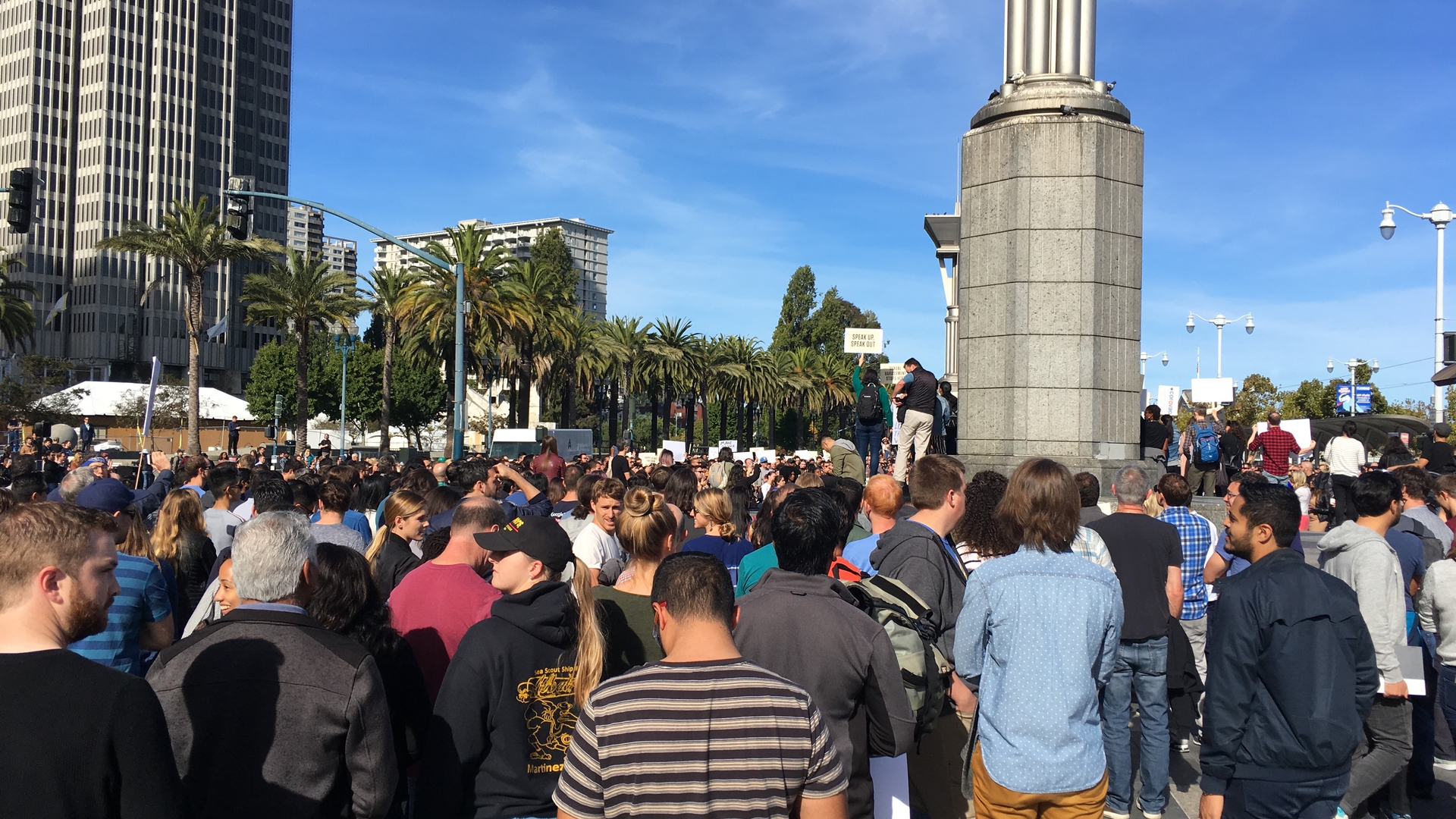‘Sorry To Bother You’ and tech worker organising
by
Wendy Liu (@dellsystem)
February 14, 2019
Featured in The Call Centre Seen from Below (#6)
Notes From Below editor Wendy Liu shares her thoughts on Boots Riley’s film ‘Sorry To Bother You’, and its potential relevance for tech worker organising.
inquiry
‘Sorry To Bother You’ and tech worker organising
by
Wendy Liu
/
Feb. 14, 2019
in
The Call Centre Seen from Below
(#6)
Notes From Below editor Wendy Liu shares her thoughts on Boots Riley’s film ‘Sorry To Bother You’, and its potential relevance for tech worker organising.
This review contains spoilers.
Sorry to Bother You, Boots Riley’s 2018 film about organising a union at a call centre, is a stunning piece of agitprop that also manages to be visually dazzling and fun to watch. Who knew a film about working in a call centre could be so riveting?
I saw it twice. The first time, I was blown away. Not only was the film itself an exceptional work of art, but it was shocking to see such a profoundly radical, anti-capitalist critique appear in such a mainstream context (positively reviewed in all the major publications, too).
As a film that unapologetically champions the idea of class struggle, it will certainly appeal to those on the left, but it won’t only appeal to those on the left; it has a compelling-enough story that could inspire even people who have no idea what a picket line is.
Given how many reviews the film has already received, I’m not going to attempt a sweeping overview of the film’s plot or style. You can find that in this Jacobin review, or this interview with Boots Riley (again for Jacobin), or this episode of TrashFuture on the film, featuring yours truly. Gifford Hartman has also written a personal response to the film, in this very issue.
I want to study the film from an angle that hasn’t really been covered yet: as an allegory for tech worker organising.
Power caller, baby
Early in the film, Cassius is told that if he makes enough sales, he will ascend to the ranks of the “power caller”. And sure enough, he manages to get there, even though it means abandoning his colleagues in the middle of a work stoppage. He is taken up to the power callers’ special floor in a (literal) golden elevator, whereupon he discovers a whole new world: floor-to-ceiling windows with views of the city; celebratory champagne when he closes a sale; and, most importantly, tons of money.
It comes with strings attached, though. Of course it does: RegalView’s power callers are paid so well for the obvious reason that they help the company make a lot of money, by closing lucrative contracts. Weapons for the military are a huge line of business, as is peddling WorryFree’s slave labour to companies looking to save on labour costs (WorryFree being the huge, diversified multinational corporation in the backdrop of the film, which feels like an unsettling amalgamation of Amazon, Apple and WeWork). Cassius is initially hesitant, but when he sees the size of his signing bonus, he can’t help but cave. He knows that what he’s doing is unambiguously wrong, but he’s behind on his rent, and it would be nice to not be broke for a change. What else could he do?
Around the time the film came out, the tech industry found itself in the grip of a moral reckoning of its own. Several of the largest tech companies were revealed to be deeply entwined within the US military-industrial complex, providing services for a variety of government agencies despite them being frequently criticised for unusually cruel or just deliberately violent practices. Subsequent tech worker actions, in protest of their employers’ complicity with unjust regimes, put a stop to some of these, but other fights are still ongoing.
Unlike Cassius, not all these workers were aware of the moral quagmire surrounding the ultimate uses of their work. Many went into the tech industry because they enjoyed the work, or because that was where the money was, or some combination of the two. And unlike Cassius, most of them don’t have the option of joining anything remotely resembling a union, one that would fight for their right to have control over the products of their labour; unions are still generally weak, and that’s even more true for white-collar workers in tech. Workers are increasingly unhappy with the status quo, and some of them are starting to organise, but there’s a long way to go before the balance of power is substantially shifted.
For Cassius, the moment that crystallised his refusal to accept the system was his discovery of Steve Lift’s idea to turn people into horses to make them more effective workers. Up until then, he could shove the moral issues under the rug, concentrating instead on the thrill of succeeding at his job and the increasingly luxurious things he’s been able to buy with that success. But this discovery breaks through the protective ideological shell in which he’s had to encase himself. The price of his success has been paid for by people who didn’t have a choice in the matter, and he’s starting to realise the real human costs of the system he has bought into.
Call your senator
Somewhere in the middle of the film, there’s a truly brilliant tragicomic moment taking aim at the moral void that is the US political establishment. After Cassius has discovered the turning-people-into-horses scheme, there’s a frenzied montage illustrating his desperate attempt to get the word out to the public in order to stop it. He goes on talk shows and implores the audience to do something—specifically, to call their representatives in Congress.
The very next scene features a bipartisan press conference where both Republican and Democratic members of Congress are congratulating Steve Lift on his marvelous endeavour for raising corporate profits. Is this satire, or a matter-of-fact depiction of reality? Hard to tell.
The point is that the establishment is not going to put a stop to it. The authorities Cassius expects to fix everything are exactly the authorities who allowed it to happen under their watch. And not just allowed, but encouraged, under the aegis of a system that incentivised profits above all else and which consequently installed precisely those authorities who would maintain that system. Cassius’ naive pleas for help are a product of his mistaken belief that the people in charge will step in to set things right. But why would they?
WorryFree’s behaviour—as monstrous as it may seem to Cassius—it not an aberration. It will not be fixed by the machinations of politics-as-usual. The example of WorryFree is a case study in the system functioning exactly as it was designed to do, only in this alternate universe, completely unhindered by any concept of ‘morality’ or ‘human rights’. (Our world is a bit better, but only barely.) As Steve Lift says to Cassius after he discovers WorryFree’s new equestrian product line, it’s all rational. He is following the pursuit of profit and power all the way to its dark, bitter, horse-filled end.
Same struggle
My absolute favourite moment occurs near the final moments of the film. The police have broken through the picket line, despite Cassius’ best efforts to outwit them, and they’ve arrested him. All around him is the cacophony of an absurd amount of police violence - protesters screaming, batons cracking, bones crunching - but Cassius is trapped inside a police vehicle, and he can neither see nor offer any help. He sits there, looking utterly broken. It seems like all is lost.
But then the sounds outside change, and the next thing he knows, Cassius has been rescued from his cage by one of the horse people, whom he had helped to escape shortly before he was captured. There is an initial moment of awkwardness as they look at each other, then Cassius tries to thank him, speaking slowly under the assumption that the other guy won’t understand him easily. But he cuts him short, telling Cassius that he’s from Oakland, and sounding every bit like a human being who just happens to look like a horse.
It’s a beautiful combination of comic relief while also conveying an important political point - one that’s especially important when organising. This point is underscored when Squeeze, the IWW organiser who helped kick off the unionising efforts through salting, joins them. There is the briefest of pauses before Squeeze looks at the horse-person, makes a fist in front of his chest, and says, “Same struggle”.
I’m only slightly embarrassed to admit that I cried during this scene, both times I watched the film. The scene is the perfect distillation of the best response to the perceived fragmentation of the working class along various lines - race, gender, immigration status, industry, role, etc. When the “other” doesn’t look like you, and doesn’t behave the same way as you, it can be tempting to imagine an unbreachable wall in between, with any attempted communication being shallow and stilted. It’s easy to catalogue differences at the expense of forgetting commonalities, especially because this is the story imposed by capital: what could a highly-paid software engineer have in common with an undocumented, poorly-paid, service worker? What could a Google employee walking out to protest their company’s sexual harassment policies have in common with a Marriott worker on a picket line just a few blocks away?
What they have in common is their class interest: they are on the same side, even if capital has conspired to create various artificial differences between them. Recognising their commonality is a way to unite in the face of forces that would prefer them divided. “Same struggle”, the raised fist—a stunningly powerful image of solidarity, embedded in a larger story that makes the lesson more memorable than any Marxist tract ever could.
That is the power of political art, after all. That’s why it matters. The right story, told with enough skill, can spark the imagination in a way that dry theoretical discourse never could. That’s not to dismiss the value of theory, it’s just that it’s rarely an effective prelude to meeting people where they’re at. Theory can come later; first, you need the spark. Without dissatisfaction at the status quo, and maybe some degree of anger, even the most exemplary work of theory won’t make a dent.
The brilliance of Sorry To Bother You - and the reason it can be such a full-throated anti-capitalist work of art, while also being fun - is the way it cultivates this anger, while channeling it in the right direction. In an interview with Casper Hughes for VICE, Boots Riley says:
[…] My view has always been that I have a class analysis that says that the struggle is between the ruling class and the working class and the main contradiction of capitalism is the exploitation of labour. The point of my art has never been “you need to learn”, but “let’s go get ‘em”. And so it’s preachy if it’s “you need to learn”, but it’s not if you’re understanding who is on your side.
When it comes to organising in the tech industry, “Let’s go get em” isn’t a bad slogan.
Featured in The Call Centre Seen from Below (#6)
author
Wendy Liu (@dellsystem)
Subscribe to Notes from Below
Subscribe now to Notes from Below, and get our print issues sent to your front door three times a year. For every subscriber, we’re also able to print a load of free copies to hand out in workplaces, neighbourhoods, prisons and picket lines. Can you subscribe now and support us in spreading Marxist ideas in the workplace?
Read next

Organising Silicon Valley's Shadow Workforce
by
Wendy Liu
/
July 31, 2018


